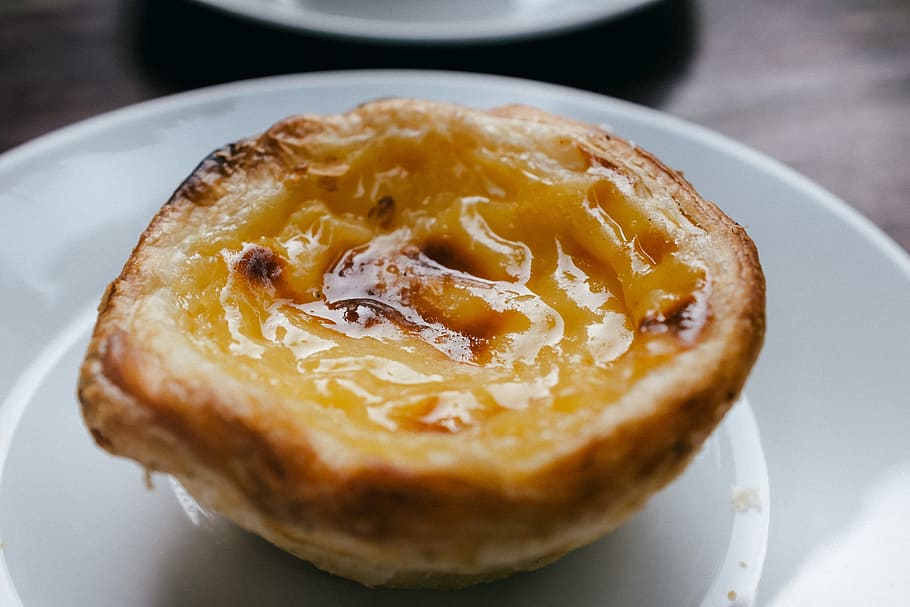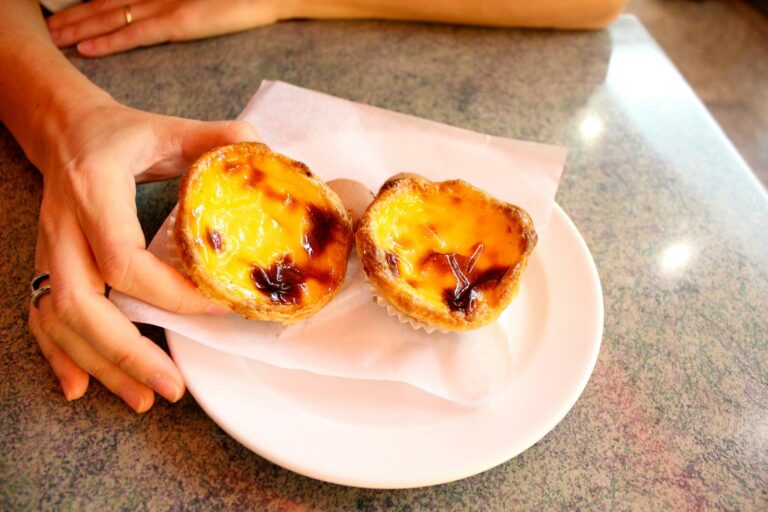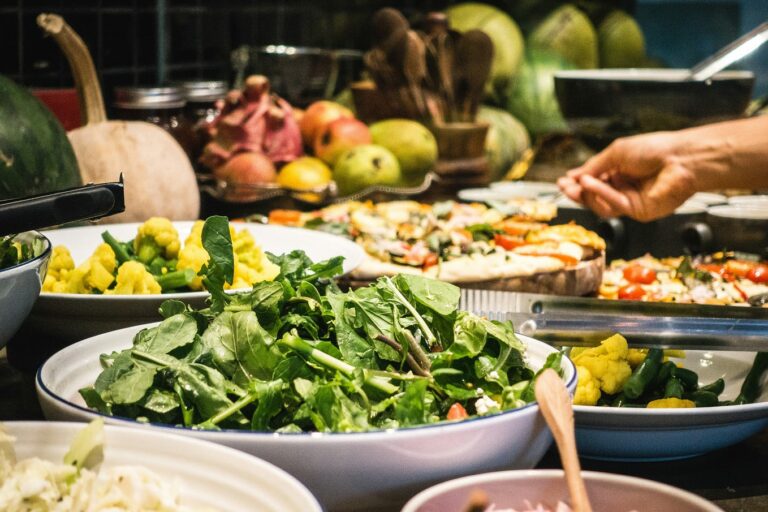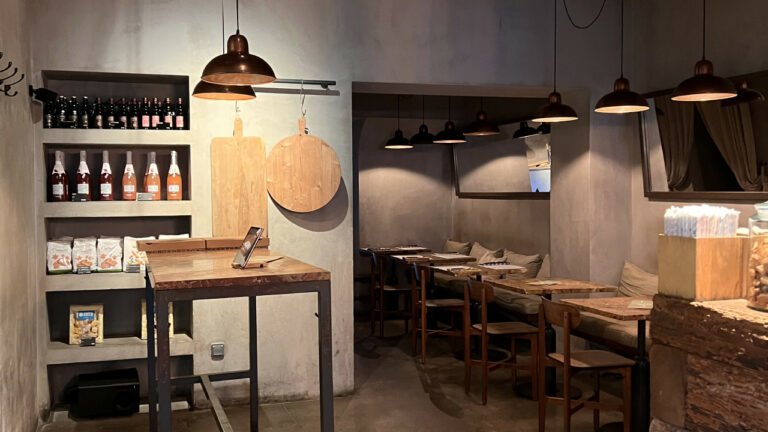I was vegan for the first time, living in the Portuguese capital. Now, you may wonder if you can find the best vegan Pastel de Nata Lisbon delight Portuguese custard tarts as it is made with eggs.
These egg tart pastries are undeniably delightful, as I found out later when tasting the traditional pastries. Yet, finding vegan pastel alternatives is a challenge. Nonetheless, living in the city differs from living in remote parts of Portugal.
Uncover the three best vegan Pastel de Nata Lisbon delight pastry shops to relish Pastéis de Nata. Bom appetite!
Hot Tip🔥: To learn more about Pastéis de Nata, check out this exciting guide on where it started at Pasteis De Belém pastry shop.
The Origin of Portuguese Egg Tarts
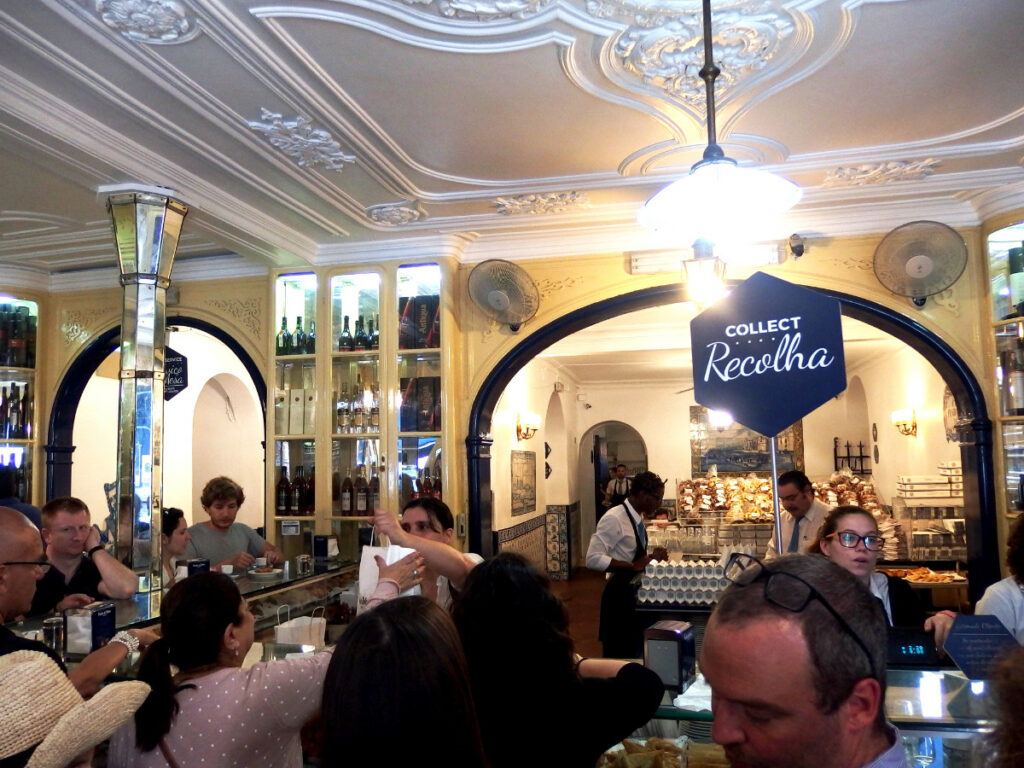
The captivating origin of Pastel de Nata unfolds at the Jerónimos Monastery in the Belem district of Lisbon, Portugal.
During the 18th century, resourceful monks, faced with surplus egg yolks from starching their habits with egg whites, ingeniously crafted a creamy, custard-like pastry—enter the delectable non-vegan versions of Pastel de Nata.
With the monastery’s closure, the monks passed their cherished recipe to a local sugar refinery. In 1837, the refinery’s owners established a bakery, Fábrica de Pastéis de Belém, which stands as a testament to time, still delighting everyone with its delicious custard tarts.
Today, the bakery remains under the stewardship of the descendants of its original proprietors.
While Fábrica de Pastéis de Belém exclusively labels its creation as Pastel de Belém, countless Pastelarias throughout Portugal offer variations of the beloved Pastel de Nata, ensuring the widespread enjoyment of this iconic pastry.
But what is the difference between the best vegan Pastel de Nata Lisbon tart and the one you can find at a vegan cafe?
The original recipe features a flaky, buttery pastry crust enveloping a luscious custard made with eggs, delicately caramelized on the surface. These tarts are frequently adorned with cinnamon or powdered sugar to enhance flavor.
Hot Tip🔥: If you want to try a gluten-free pastel de nata, there are a few places to try them in Lisbon.
The Easy Lisbon Quiz
Ready to test your Lisbon knowledge?
I’ve made an easy Lisbon quiz with 5 questions. Let’s see if you can get them right. 🤞
Crafting the Perfect Vegan Pastel de Nata

For those following a vegan lifestyle, the traditional Portuguese Pastel de Nata might seem off-limits due to its inclusion of egg yolks, milk in the custard, and butter in the crust.
Regardless, there’s good news for vegan enthusiasts as some Portuguese bakeries have crafted a plant-based version of this iconic pastry named Vegan Nata.
Creating a vegan crust is relatively straightforward by substituting vegan butter for conventional cow’s milk butter.
The real challenge lies in perfecting the custard without traditional animal-based ingredients.
While vegan Pastelarias typically guard their recipes closely, a plausible vegan custard might involve a blend of silken tofu and nuts.
Or a milk substitute, starch, and nutritional yeast, resulting in a delightful plant-based twist to the classic treat.
Planning On Going To Lisbon?
I’ve created a trip planner where you enter the number of days you’re going and what activities you want to do.
Based on your input, you then get an entire vacation planned with ideas.

3 Best Vegan Pastel de Nata Lisbon Delights
Lisbon, a sprawling city with numerous vegan restaurants, may not have many offering vegan custard tarts of the national dish Pastel de Nata. Here are the top places in Lisbon to savor this creamy tart.
VeganNata: Savoring Sustainability
Nestled within Lisbon’s vibrant culinary landscape, VeganNata emerges as an institute, redefining the Portuguese tarts.
Founded by two eco-conscious entrepreneurs passionate about veganism, this bakery offers the best vegan Pastel de Nata Lisbon pastries. They have made some famous pastel tarts that emphasize sustainability.
With three strategic locations across the city, it’s easily accessible for those craving a guilt-free indulgence. The vegan Natas here boasts a perfect balance—flaky on the outside and luxuriously creamy within.
So, you can enjoy a perfect Pastel enjoying sweet pastries famous in Portuguese cuisine.
Explore more at Vegan Nata and map your route with directions.
Here are the best things to do in Lisbon In June 2024
I’ll send you a list of the best things to do in May and every month moving forward from today.
It’ll be based on my personal experience of living and traveling around Lisbon. A lot of hidden gems.
A Minha Avo: Crafting Artful Vegan Pastries
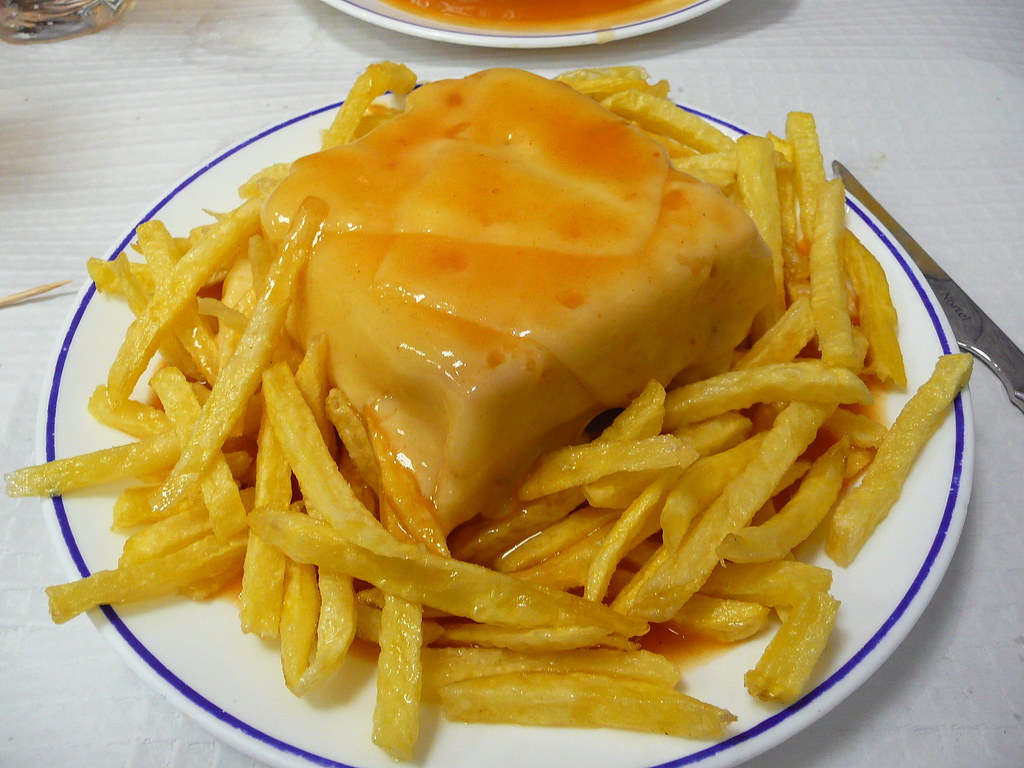
A quaint restaurant near Parque Eduardo VII, A Minha Avo, is a delightful haven for those seeking an immersive experience in Portuguese pastry.
Beyond offering vegan renditions of traditional dishes like Arroz sem Pato and Francesinha, they have reimagined the classic round Pastel de Nata.
At A Minha Avo, expect a visual treat – a rectangular pastry with a divine cream filling inside the crust, served alongside a scoop of ice cream and a sprinkle of cinnamon.
Plan your visit to A Minha Avo with more insights and follow these directions.
Café Moko: A Vegan Oasis
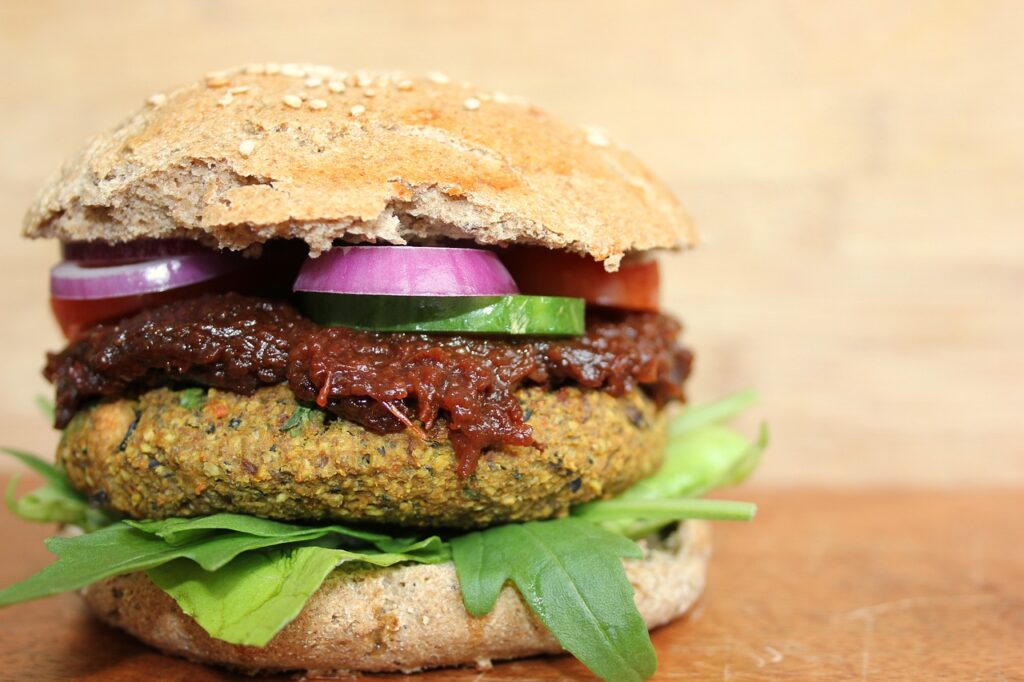
For the best vegan Pastel de Nata Lisbon delight, the bakery Cafe Moko stands out as a vegan haven, especially for delicious pastries.
The vegan bakery/café combo caters to a diverse palate with offerings like vegan burgers, salads, and soups and boasts highly regarded vegan Pastéis de Nata.
Frequented by local vegan enthusiasts, Café Moko is a perfect spot for a leisurely breakfast or a rejuvenating lunch break, offering an array of delectable vegan treats.
Discover more about Moko Veggie Café and chart your course with these directions.
Vegan Pastéis de Nata Recipe
Indulging in the classic Portuguese delight, Pastéis de Nata takes on a vegan twist in this delightful recipe. With a flaky pastry crust cradling a luscious custard, this vegan version promises the same iconic flavors, cruelty-free.
Ingredients:
For the Pastry:
- 2 cups all-purpose flour
- 1 cup vegan butter, chilled and grated
- 1/2 cup cold water
- A pinch of salt
For the Custard Filling:
- 2 cups plant-based milk (such as almond or soy)
- 1 cup granulated sugar
- 1/2 cup cornstarch
- One teaspoon of vanilla extract
- A pinch of turmeric (for color)
Steps:
1. Prepare the Pastry:
- Combine the all-purpose flour and a pinch of salt in a large mixing bowl.
- Gradually add the grated chilled vegan butter to the flour, using your fingers to create a breadcrumb-like texture.
- Slowly incorporate the cold water into the mixture, kneading until a smooth dough forms.
- Shape the dough into a rectangle, wrap it in plastic wrap, and refrigerate for at least 30 minutes.
2. Create the Custard Filling:
- Mix the plant-based milk, sugar, and cornstarch in a saucepan over medium heat.
- Continue stirring until the mixture thickens, ensuring there are no lumps.
- Once thickened, remove from heat and stir in the vanilla extract. Add a pinch of turmeric for a golden hue.
- Allow the custard to cool, then refrigerate.
3. Assemble the Pastéis de Nata:
- Preheat your oven to 475°F (245°C).
- Roll out the chilled pastry on a floured surface until thin. Cut into squares large enough to fit your tart molds.
- Press the pastry squares into the molds, ensuring an even distribution along the sides.
- Spoon the chilled custard into each pastry shell, filling them about two-thirds full.
4. Bake to Perfection:
- Place the filled molds in the oven and bake for approximately 15-20 minutes or until the pastry is golden and the custard has a delightful caramelized top.
- Keep an eye on them to prevent over-browning.
5. Enjoy:
- Once baked, allow the Vegan Pastel de Nata to cool in the molds for a few minutes before transferring them to a wire rack.
- Serve these delectable treats warm, dusted with a sprinkle of powdered sugar or cinnamon for that perfect finishing touch.
Now, savor the plant-based goodness of your homemade Vegan Pastel de Nata – a compassionate twist on a Portuguese classic!
Wrap-Up: The Best Vegan Pastel de Nata Lisbon Delight
As you navigate the charming streets of Lisbon, let these vegan havens redefine your perception of plant-based pastries. From the flaky layers of pastry to the rich, creamy custard, each establishment weaves a unique tale of vegan indulgence. Your journey into the Vegan Pastel de Nata world promises a delectable adventure in flavors and ethics.
The Advanced Lisbon Quiz
You’re now at the advanced Lisbon quiz with more difficult questions. No one gets every question right, so don’t beat yourself up on it. Good luck.
Frequently Asked Questions
Can vegans eat Pastel de Nata?
Traditional Pastel de Nata is not vegan-friendly, containing eggs, milk, and butter. Yet, some bakeries in Lisbon offer vegan versions of this iconic pastry.
What are the best vegan Pastel de Nata bakeries in Lisbon?
Some of Lisbon’s best vegan Pastel de Nata bakeries include VeganNata, A Minha Avo, and Café Moko.
What are the ingredients used to make vegan Pastel de Nata?
The ingredients used to make vegan Pastel de Nata vary from bakery to bakery. Nevertheless, some common substitutes include vegan butter, silken tofu, nuts, and milk substitutes like soy, almond, or oat milk.
Is it difficult to make vegan Pastel de Nata?
Making vegan Pastel de Nata can be challenging as it requires a delicate balance of ingredients to replicate the traditional custard-like filling. However, with the right recipe and ingredients, making a delicious vegan version of this pastry is possible.
What is the origin of Pastel de Nata?
Pastel de Nata originated in the 18th century at the Jerónimos Monastery in the Belem district of Lisbon, Portugal. It was initially created by monks who used surplus egg yolks to make a creamy custard-like pastry. The recipe was later passed to a local sugar refinery, which established a bakery called Fábrica de Pastéis de Belém in 1837.
